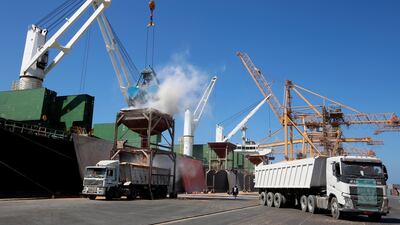Britain should shrug off its foreign policy failures and take greater risks to help resolve the world’s problems including the humanitarian crisis in Yemen, a government minister wrote on Sunday.
The UK should play a role in “stabilising” the port of Hodeidah, the gateway for aid and supplies to much of the country, said Tobias Ellwood, a defence minister.
“We must be less risk averse, haunted as we are by our experiences is Iraq and Afghanistan,” he wrote in an article for Britain’s Sunday Telegraph.
“The conflict in Yemen, for example – a protracted civil war with proxy influences compounding the worst humanitarian crisis in the world – is a challenge that Britain and it allies could help to resolve.”
He said that the Red Sea port was “calling out to be stabilised” by a third party. “This should not mean Britain always doing the heavy lifting but coordinating with others to make this happen,” he wrote.
The Yemeni army, backed by the Saudi-led coalition, has been making rapid advances in Hodeidah, hoping to cut off the last main route used by the rebels to smuggle in weapons from Iran.
They have intensified an offensive against the Houthi rebels - who hold the port city - since former president Ali Abdullah Saleh was killed last month.
The comments by Mr Ellwood follow a visit by Theresa May, the prime minister, to the Middle East in November when she said the government wanted to see “full humanitarian and commercial access” through the port. She said she would be raising the issue while in Saudi Arabia.
The Saudi-led coalition eased the blockade on the port in November. It said in December it would keep it open for a month despite a missile attack against Riyadh but has kept up air raids on the rebel-held port city.
Britain – the third largest bilateral donor to Yemen – has said that a political solution to the conflict is the only means to restoring long-term stability in the country.
_____________
Read more:
Arab foreign ministers in London hail progress in re-opening Yemen's ports
Yemen war: Senior Houthi and his fighters surrender to army in Hodeidah
_____________
Mr Ellwood’s comments come amid reported tensions within the government over anticipated cuts to defence spending that Mr Ellwood warned would have consequences to the long-term security of Britain.
“The threats we face are constantly evolving, yet old-fashioned force still matters,” he wrote. He said that Britain needed to be prepared to face new threats such as cyber attacks and the advance of robotics in the arms industries.
“But this must not come at the expense of conventional legacy capabilities – warships, planes, submarines, armoured vehicles and our world-class personnel – which remain relevant not just for high-end war-fighting but for preventing conflict by deterrence and engagement.”
His comments on overseas intervention follow similar sentiments expressed by foreign secretary Boris Johnson in December when he said that Britain would seek to play a greater role in the Middle East after the failure to intervene in Syria sparked an immigration and security crisis.
In a speech in London, Mr Johnson spoke of the need for greater engagement as we “cannot just seal off the whole of the Middle East and North Africa and give them 50 years to sort themselves out”.
He said that the West’s unwillingness to act against Bashar Al Assad had opened the way for Russia and Iran to play a greater role in Syria. He also called on the West to do more to resolve the conflict in Yemen and bring together factions in Libya.

